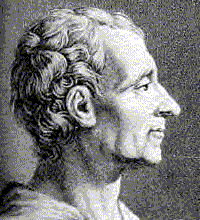
1689-1755

1689-1755
Charles Louis
de Secondat, otherwise known as the Baron de Montesquieu, was born in the
Château de la Brède, to an affluent family. Although
his family was wealthy, during his childhood he was taken care of by a
poor family. He was educated at the Oratorian school at Juilly and
later at Bordeaux, where he studied history and science, and eventually
became a lawyer. His father died in 1713, leaving him in the care
of his uncle, the Baron de Montesquieu. When the latter died in 1716,
de Secondat received his fortune, his office as president of the Bordeaux
Parliament, and his title of Baron de Montesquieu. He remained president
of the Bordeaux parliament from 1716 to 1728. He was a member of
the Bordeaux and French
Academies of Science, which aided him in his studies of the laws, customs
and governments of European countries.
Montesquieu first gained respect as a writer in 1721, with his Persian
Letters. They condemned the liberties and lifestyle of the opulent
French and the church, as well as French politics and literature.
In 1734, Montesquieu released his Thoughts on the Causes of the Greatness
and the Downfall of the Romans. However, Montesquieu is most famous for
The
Spirit of Laws, which was published in 1748. In this book, he surveyed
three types of government: republic, despotism, and monarchy. He
came to these conclusions:
1. If one person has too much power, there is no liberty.
2. If the judiciary power is not separated from other power, there is no
liberty.
3. Power should be able to check other power.
He called his idea of dividing the government's power into three branches the "separation of powers," finding it important to create separate branches of government with different but equal powers. Thus, the government would avoid giving too much power to one individual or one group. Each branch of government could limit the power of the other branches, hence, no branch of the government could threaten the people's liberty. Montesquieu's separation of powers became the basis for the United States Constitution, forming the legislative, executive and judicial branches of the government, giving each branch the power to check another branch's power.
![]()
Literature by Montesquieu
![]() Persian
Letters 11 and 12
Persian
Letters 11 and 12
![]() Persian
Letters 13
Persian
Letters 13